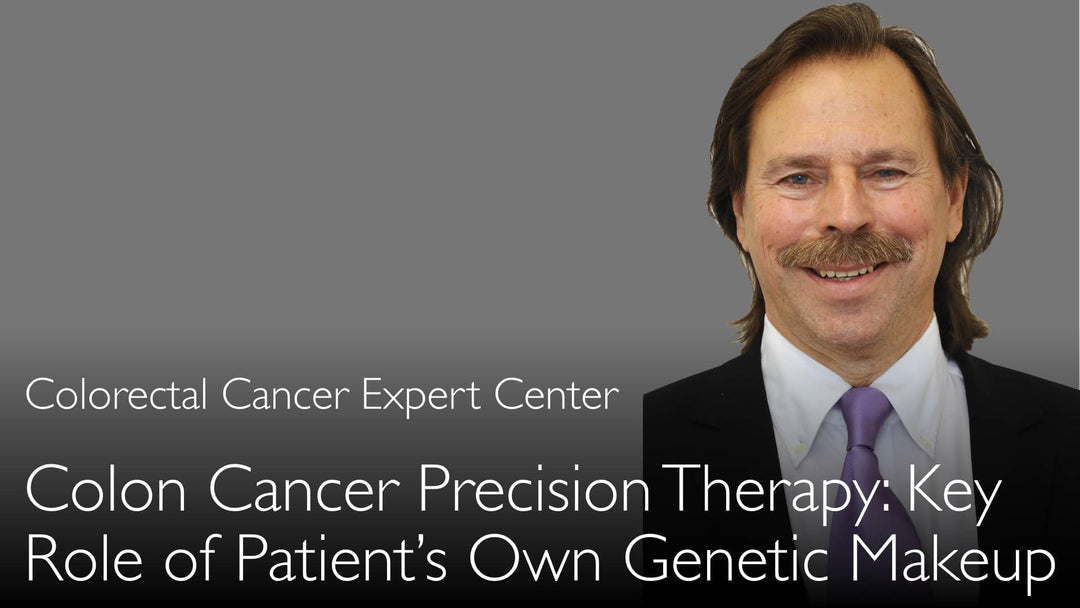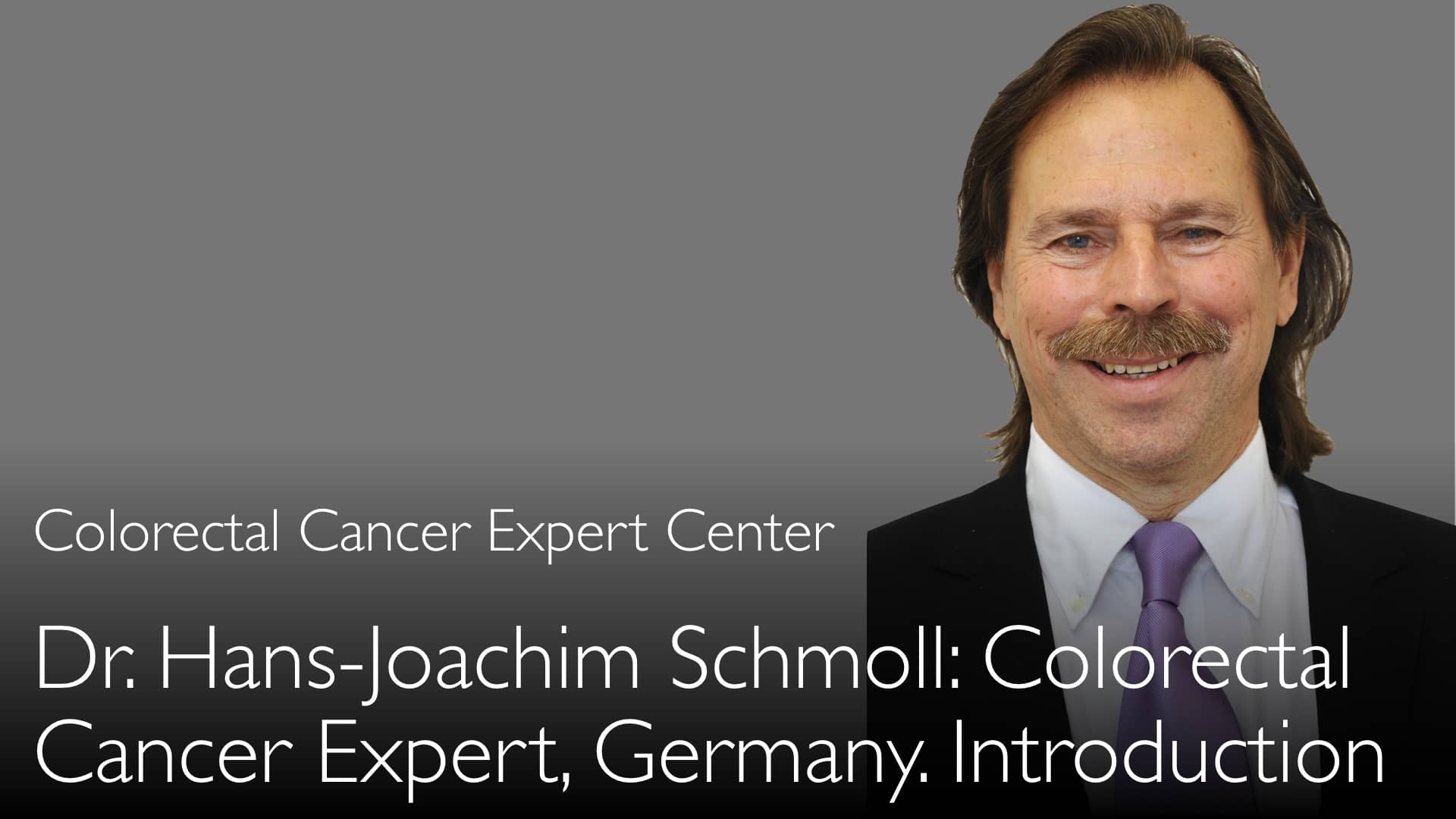Leading expert in colorectal cancer, Dr. Hans-Joachim Schmoll, MD, explains how a patient's own genetic profile is critical for treatment personalization. He details recent clinical trial data showing germline mutations significantly influence chemotherapy response and toxicity. This patient genetics analysis is now as important as tumor genetics for precision medicine. Dr. Hans-Joachim Schmoll, MD, discusses the future of colon cancer classification and therapy selection.
Personalizing Colon Cancer Treatment: The Critical Role of Patient Genetics
Jump To Section
- Why Patient Genetics Are Crucial in Colon Cancer
- Germline Mutations and Chemotherapy Metabolism
- Clinical Trial Evidence for Genetic Influence
- The Future of Colon Cancer Classification
- The Complexity of True Precision Medicine
- Full Transcript
Why Patient Genetics Are Crucial in Colon Cancer
Dr. Hans-Joachim Schmoll, MD, emphasizes that personalized colon cancer treatment requires analyzing both the tumor and the patient. He explains that a patient's inherited genetic makeup, known as germline DNA, plays a vital role. This genetic information influences how the body processes chemotherapy drugs. Dr. Anton Titov, MD, discusses this paradigm shift with Dr. Hans-Joachim Schmoll, MD, highlighting its importance for modern oncology.
Germline Mutations and Chemotherapy Metabolism
Germline mutations are normal genetic variations present in every cell of a patient's body. Dr. Hans-Joachim Schmoll, MD, clarifies these variations do not cause illness themselves. However, they significantly impact drug metabolism. These polymorphisms determine the level of toxicity a patient experiences during treatment. Understanding this helps oncologists predict and manage side effects more effectively.
Clinical Trial Evidence for Genetic Influence
Recent data from major cancer conferences provides strong evidence. Dr. Hans-Joachim Schmoll, MD, references analyses of stage 4 colorectal cancer clinical trials. The studies found a patient's germline genetics had a massive influence on chemotherapy response. The statistical significance was extremely high, with a p-value of 0.001. Dr. Hans-Joachim Schmoll, MD, notes this genetic effect was more significant than differences between treatment types.
The Future of Colon Cancer Classification
Dr. Hans-Joachim Schmoll, MD, predicts future staging systems will incorporate more than three stages. Treatment personalization will be based on the expected disease course for each individual patient. This new classification will integrate data from both tumor genetics and the patient's own genetic profile. Dr. Anton Titov, MD, explores how this comprehensive analysis will lead to better prognostication.
The Complexity of True Precision Medicine
Achieving fully personalized medicine is a complex endeavor. Dr. Hans-Joachim Schmoll, MD, states it requires large clinical trials with many patients. He believes that while research is advanced, it is not yet routine clinical practice. True precision medicine means a complete analysis of tumor mutations and the patient's genetic makeup. This dual analysis will ultimately allow therapy to be perfectly adapted to the individual.
Full Transcript
Dr. Anton Titov, MD: Why is the genetics of the patient equally important to the genetics of the tumor for colorectal cancer treatment? Why should we identify key gene mutations in the patient for correct treatment? How to personalize colorectal cancer treatment according to the patient’s genetics?
A leading colorectal cancer oncologist and research expert discusses colon cancer diagnosis and treatment options.
There will be more than three stages of colorectal cancer classification when more research is done. Treatment of the patient will be personalized based on the expected course of disease in a given patient.
Dr. Anton Titov, MD: The question is then how to achieve personalization of colon cancer treatment. Currently, the most advanced methods are research-grade. They are not in routine clinical practice.
Dr. Hans-Joachim Schmoll, MD: Many features of the colon cancer tumor and also of the patient will be analyzed to personalize therapy. There was a European cancer conference and a conference in the United States a few weeks ago. Different clinical trials of stage 4 colon cancer treatment were analyzed.
The results of stage 4 colon cancer treatment trials are now known. They looked into the germline mutations in the patient's DNA. Not only tumor tissue was analyzed.
The normal DNA of the body has a lot of mutations and genetic variations. These genetic variations in the patient's body do not create an illness. But they influence the metabolism of chemotherapy medications.
Normal human DNA polymorphisms influence how much toxicity a patient has during chemotherapy.
Dr. Anton Titov, MD: There are many possibilities for the germline mutations to influence colon cancer course. Personalized medicine methods not only predict the genetic mutations in the tumor. Precision medicine looks at the genetic makeup of the patient.
This helps to predict the response to therapy and potential toxicity.
Dr. Hans-Joachim Schmoll, MD: Correct. Clinical trials analyzed different chemotherapies in stage 4 colorectal cancer. Patient genetic differences had a huge influence on chemotherapy response from the tumor.
The difference had a p-value of 0.001, which is highly significant.
Dr. Anton Titov, MD: This difference in how patients responded to treatment based on germline mutations was very significant. It was more significant than any change in treatment or any difference from one type of treatment to the other.
The genetic makeup of the patient is highly relevant for treatment. It was not known until now that these germline mutations influence the outcome of treatment so much.
The genetic makeup of the patient is another component that must go into colon cancer classification. To select personalized therapy for a colon cancer patient, we must not only analyze the tumor mutations.
Dr. Hans-Joachim Schmoll, MD: We must also analyze the makeup of normal body cells. This DNA is inherited but not changed by a mutation. Precision medicine is more and more complex.
It requires big clinical trials with many patients. Someday we will finish research. We will have truly personalized medicine.
It is probably not the case now. Personalized medicine means complete analysis of the tumor mutations and the patient's genetic makeup. Then we can use the patient's characteristics to adapt the treatment methods.
Dr. Anton Titov, MD: We will base therapy on colon cancer prognosis coming from analysis of the tumor and the patient.





